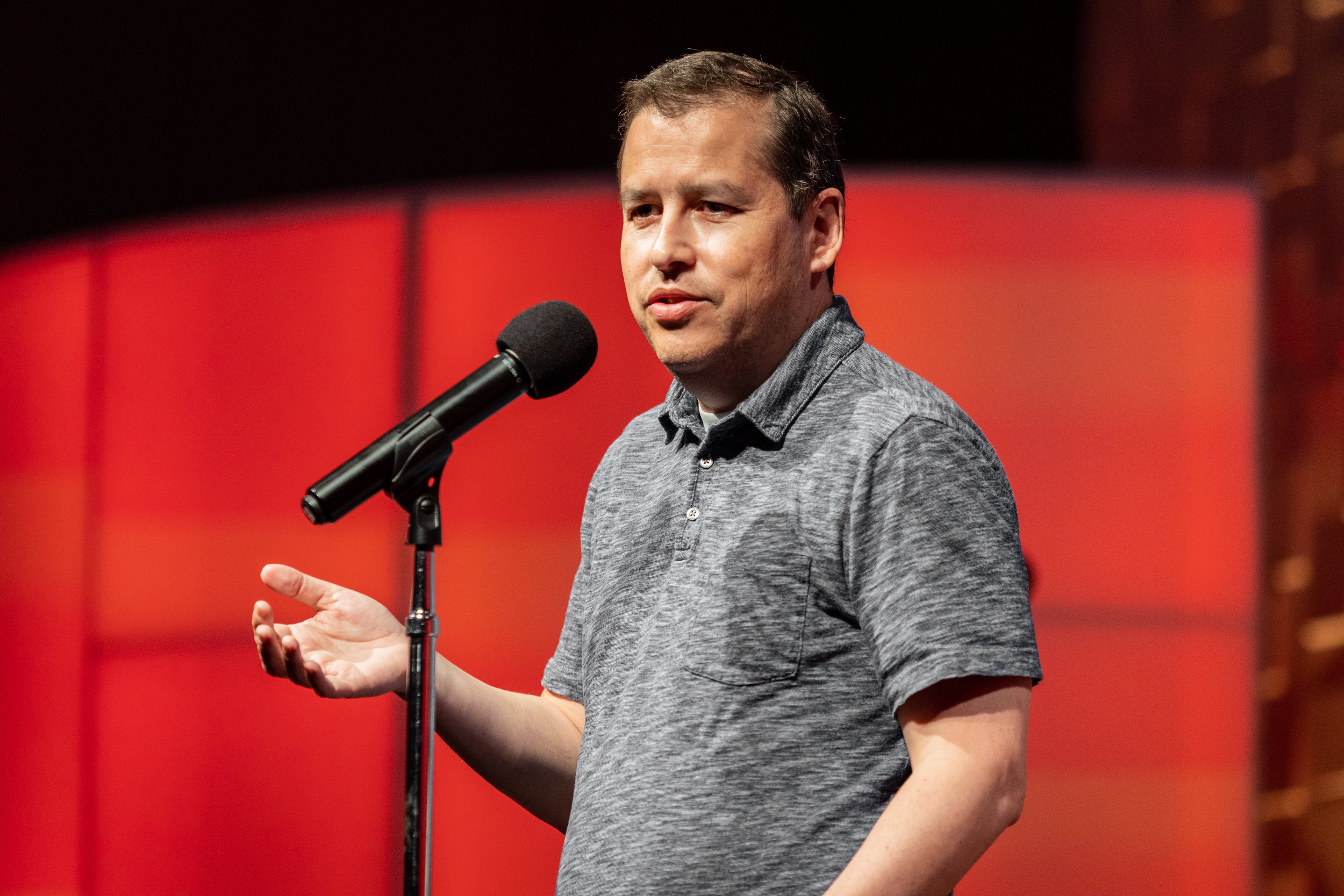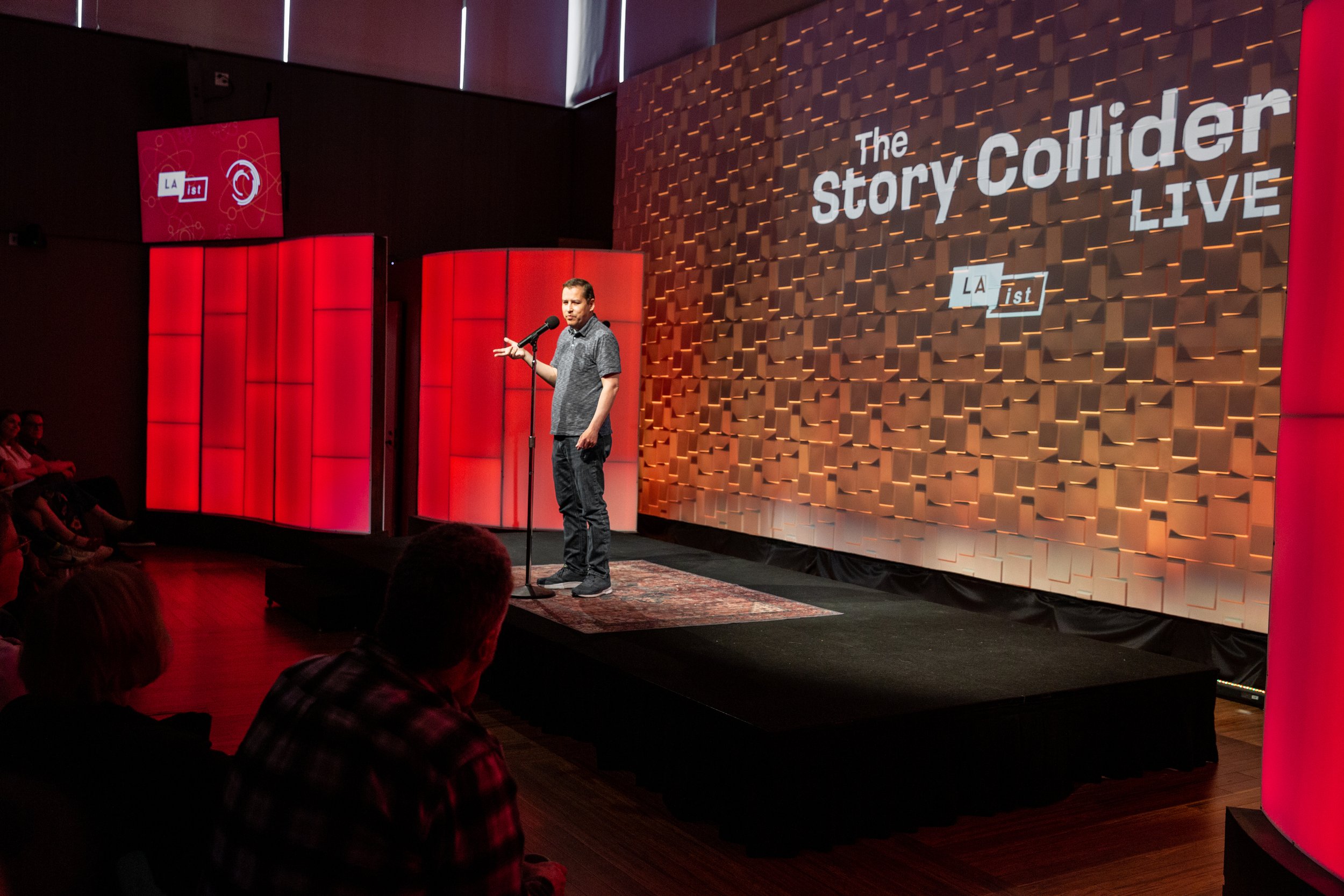In this week’s episode, both of our storytellers experience the most humbling of human experiences: being embarrassed.
Part 1: Emma Yarbrough feels in control of her future after undergoing an egg retrieval operation until a burning sensation sends her for a loop.
Emma Yarbrough is a storyteller, actor, playwright, arts administrator and silly billy from beautiful (and tiny) Eufaula, Alabama. Fans of Story Collider in Atlanta may recognize her as one of our producers and hosts. During the day, she’s the assistant director of Emory Arts at Emory University. At night, she’s a handmaiden to her cats Christopher Robin and Christopher Lloyd.
Part 2: When the doctor finds blood in Carlos Kotkin’s urine, he ends up having to undergo some deeply humiliating procedures.
Carlos Kotkin is an author, screenwriter and humorist. His dating memoir "Please God Let It Be Herpes: A Heartfelt Quest For Love And Companionship" was published in 2012 and he has also written a number of animated features, including Rio 2, Open Season: Scared Silly, The Star and the soon-to-be released Giants of La Mancha. His stories have been featured in The New York Times’ Modern Love, Reader's Digest and Sunset Magazine, even though the Sunset Magazine was whittled down from five pages to one paragraph. (They still paid him.) His stories have also been aired on The Moth, Risk and KRCW’s Unfictional podcasts. He was valedictorian of his high school, then promptly dropped out of the University of Southern California, so he never thought he’d be in a show about science, but here we are. He's not a fan of writing about himself in the third person.
Episode Transcript
Part 1
I'm not what you would call lucky in love, but I do try. I try pretty hard. And for the last decade and a half I've been on and off dating apps regularly. That's right. That's how it feels when you're off the apps. When you let yourself go off the apps you're just woohoo, you know? Especially if you're a woman because they say that the happiest subset of the population is single, childless women. Can confirm, right? Can confirm.
I think one of the reasons is because we're socialized to be caregivers and so when we don't have a partner, when we don't have children, all of that care, all of that good energy goes right back to numero uno.
But the problem is I still want a partner and I want a family. I basically would like to experience every kind of love that life has to offer. I want to challenge myself in the way that you can only do if you have an intimate relationship with someone else. So after one of these extended breaks from being off the apps, I just turned 33 and I was feeling really good about the future. I was just like this just feels like my year, you know? Like 33. It's your Jesus year. You're going to be reborn and ascend into heaven and meet your true potential.
Emma Yarbrough shares her story at Underground Atlanta in Atlanta, GA in February 2023. Photo by Jason Abreu.
And so I took some cute pictures, I reactivated my dating apps and the date was late February 2020. You guys remember late February 2020? Similar to love, I'm not exactly the best at timing, because then we get walloped by a worldwide pandemic and we all retreat into our caves, especially me because I take some medicine that makes me immunocompromised so I was very isolated. I was not dating.
A year into the pandemic, still isolating, I start to think about my fertility because at this point now I'm 34. I'm like a year away from the dreaded geriatric pregnancy, if I get pregnant. I don't know when I'm going to be able to date again. And then I don't know when I start dating when I'm going to meet my person and then I don't know when we are going to decide that we want to have… it's just everything's getting kicked down the road, so I decide to freeze my eggs.
I go into the process. I don't know how many of y'all know about what this entails but it's a lot. It's a lot. And I'm doing it by myself. There's just all these different types of hormones. At least the one thing I had going for me was that I was going to be completely isolated, so if I just started going crazy with the hormones it wouldn't affect anybody.
But you have to do math about how much medicine you have left and there's this very regimented schedule and I have raging ADHD, so like I've never been great at schedules. But, somehow, I manage okay. Actually, the hormones don't really affect me at all. I feel just fine. I'm able to continue working. I'm not stressed. I'm doing great.
The time comes. We're at the end of the month and I give myself that final shot to trigger ovulation and then I head to the hospital for my egg extraction procedure.
There's just one little hiccup, which is that I've started to feel this burning sensation in a very private area, a very private area. So I think, well, I might as well, while I'm here, just ask the nurses if they will ask the doctor while he's down there to give it a look and see if he sees anything weird.
So I go under. The procedure goes really well. I come out and the doctor comes in. He's like, “Great job. We got buckets of this.”
And I'm just like, “Oh. Oh, great. That's awesome. How did it look down there?”
And he's like, “Fine.”
Then I immediately am like, “Oh, no. The nurses did not tell him what I asked them to tell him and this man thinks I have just asked him to rate my vagina.”
Emma Yarbrough shares her story at Underground Atlanta in Atlanta, GA in February 2023. Photo by Jason Abreu.
So I'm sent on my merry way and I go home to recover. The recovery is not so bad. Just some cramping, which I'm a woman so I'm used to it, but the burning doesn't go away. In fact, it gets worse. It becomes painful and then I see a blister. And then I see multiple blisters.
I'm a woman of the world. I know what it means when you have blisters on your hoo ha. Like it's genital herpes. It's genital herpes which, honestly, no big deal. Everybody has herpes. I'm sure you all have herpes. Right? Let's hear it for herpes! [Applause]
But I am upset. I am upset because, like I said, at this point I had taken a break from dating and then a worldwide pandemic, so at this point it's an extended drought. In three years I have had sexual congress one time. One time. We use protection and it wasn't even that memorable and that's how I get genital herpes? This is not fair.
Looking back on it, there were all of these omens. Like the first time he was supposed to come over and hang out, he got mugged on the way to my house. And then the second time he was supposed to come over and hang out, my hot water heater in my kitchen started spurting out a high pressured mist of hot water everywhere, like the Rainforest Cafe. Like the produce section of the grocery store. It's just ‘phshh’.
But I prevailed. I persisted and I was disappointed.
So I call the gynecologist. I make myself an emergency appointment. The doctor emerges from between my legs and has this look on her face and she's like, “I don't think this is herpes, but I don't know what it is.”
I'm like, “Cool, cool.”
So she takes some samples. She leaves to go test them and I lay there looking up the ceiling questioning all the decisions that have brought me to this point.
Then when she comes back she's so excited. She is so excited and she looks at me and she goes, “I know what it is and I've only seen it once before,” which are very comforting words from your 60 something healthcare provider, let me tell you.
She looks me in the eyes and she says, “Dear, you have shingles on your vulva.”
I'm sorry? Did you hear that? Shingles on my vulva. So why would they be there, right?
But the doctor is like, “You know, it's probably because you're immunocompromised that you got them.”
I'm thinking maybe because I've been just giving so much energy and focus to that area of my body that like that's where they decided to pop up. And this whole time I've been so proud of myself. I was like, “These hormones aren't affecting me at all. I am handling this stress so well. I'm going to get oodles of eggs.” And then my body is like, “Just one second, bitch.”
Emma Yarbrough shares her story at Underground Atlanta in Atlanta, GA in February 2023. Photo by Jason Abreu.
So the doctor prescribes antivirals because, by the way, did you know that the virus that causes chickenpox and shingles is a herpes virus so I was kind of right. It's just not that herpes virus.
I head home to convalesce for like two weeks. It takes a while. It takes a while for shingles to clear, funnily enough.
Control is a myth. We really have zero control over our timelines. We have such little control over the outcomes that we're going to have. I have no control over when I'm going to find love, but I am very glad that I did give myself or take a little bit more control, especially considering that, as a woman, I'm often losing control over my reproductive rights. I did take advantage of that and now I have this option.
I'm also glad to know that I can take care of myself through two weeks of just insane pain. Like so much pain, like just in my bed, by myself cry laughing with an ice pad that they give postnatal women. I'm just basically wearing like a cooling diaper we used to get, just thriving. And I can get through that on my own.
I'm most glad that yesterday afternoon I got in the car and I drove myself to my primary care physician and a nurse there injected me with the second round of my shingles vaccine.
Thank you.
Part 2
Not too long ago, I went to get my yearly physical with Dr. Kovac, and Dr. Kovac said, “Everything looks great. Everything checks out. Except, oh, we've found microscopic traces of blood in your urine. That's probably nothing, but it might be bladder cancer. It's probably nothing but we should figure out what it is and what's going on.”
So I pee in a bunch more cups for him and it's the same problem I go through, like doing MRI, a bunch of tests and they can't figure out what's happening. I ultimately end up in the office of a urologist, which was my first urologist. Little Carlos is growing up.
So the urologist is named Dr. Erlicker. He had a crazy white mane of hair. He looked like a mad scientist. He told me, “Carlos, we're going to have to perform a cystoscopy on you. Have you ever had one done before?”
And I said, “I don't think so. What's a cystoscopy?”
And he said, “Oh, it's very simple. All we do is we take a camera, insert it into your penis, send it up the urethra, look around your bladder. It's no big deal.”
Carlos Kotkin shares his story at Crawford Family Forum in Los Angeles, CA at a show sponsored by LAist in June 2023. Photo by Louis Felix for LAist.
I said, “I've definitely never had that done before. I would remember something like that.”
He said, “Okay. Well, like I said, it's no big deal. I perform the cystoscopies on Tuesdays.”
And I said, “Oh, I'm so sorry. Tuesdays are bad because I'm never doing that in my whole life, so Tuesdays aren't going to work.”
I left. I didn't make an appointment. I said, “It's nice to meet you,” and I left.
I went home and I told my wife about the crazy thing that the crazy doctor wanted to do and my wife said, “Well, you're doing that because we have a five year old and I need to know if you're dying because I need to make plans.”
Those were not her specific words but that was the subtext of what she was saying. She's a planner.
So I very reluctantly called Dr. Erlicker's office to make an appointment and a woman named Linda answered. I asked Linda half jokingly, half seriously if she ever heard patients scream during the procedure. I was seeking comfort. I wanted her to say to me, “Of course not. No. Never.” Instead, she said, “Sometimes.” Sometimes.
And then she said, “But if you can get to your happy place, you'll be fine.”
I thought, “Linda, I can't get to my happy place if somebody is inserting a camera into my happy place.”
So I schedule the appointment. It was like two weeks later. And in those two weeks, it was all I could think about. I would try not to think about it which would make me think about it more. I would wake up, I would dream about it, I would eat, sleep, breathe the cystoscopy. It was so much stress and anxiety.
I thought maybe if I know what I'm getting into, it'll calm me down so I watched some videos. That didn't work. That didn't. And they were animated videos but very different from Zootopia or Finding Dory. It just amplified the stress.
Carlos Kotkin shares his story at Crawford Family Forum in Los Angeles, CA at a show sponsored by LAist in June 2023. Photo by Louis Felix for LAist.
Finally, two weeks later, the day comes. I'm sitting in the lobby. I'm super nervous and I decide I should pee, because nobody's told me any details about how it's going to work but I just assume that it probably might damage the camera if it gets wet so I'm going to go pee.
So I go pee, I come back and this strapping, tall, young man introduces himself to me. His name is Ryan. He says, “I'm gonna be your nurse today. And before we go back, can you just do me a favor? Can you pee in this cup?”
And I said, “Ryan, I just did that. I just peed.”
Suddenly Ryan turned into the Salvation Army. He said, “Well, whatever you could give would be a huge help.”
So I go back to the bathroom thinking that I'm only going to get like a few drops out. I'm so nervous that I guess I'm not in tune with my body and I don't realize what's going on because I start peeing and peeing and peeing and peeing. I'm filling up the cup and I'm not standing in front of the toilet. I'm looking at it and thinking, “Well, I'm gonna fill this.”
Then I do fill it. And instead of taking two steps over to the toilet, I just move the cup away and I just start peeing on the floor like a maniac, like I'm trying to put out a fire. Then I took the paper towels, this is really detailed, and I cleaned up. I was in there way longer than I should have been.
Then I come out and I give my cup to Ryan, who was really proud of me. And we head down to the to the room where we're going to do this thing.
As we're walking down the corridor, I say to Ryan, “Ryan, I have to tell you. I'm not looking forward to this.”
Again, I'm seeking comfort. I want Ryan to say, “Don't worry about it. It's no big deal. You're gonna be totally fine.”
Ryan says to me, “Yeah, I don't blame you.”
So we go in the room and I have to change into that stupid gown where your butt is hanging out. I lie down on the table, the exam table and Ryan, super casually, he says, “Okay, Carlos, I'm gonna wash your penis now.”
And I said, “Oh, that's okay. I appreciate it but I took a shower. That's fine.”
And he said, “No, no. I have to. It's part of the procedure.”
And so, suddenly, I'm staring up at the ceiling and Ryan is washing me. This is my story about science.
As he's washing me, after a few moments I'm staring at the ceiling and I think to myself, you know, under different circumstances this wouldn't be so bad.
He finishes. He's standing next to me and Dr. Erlicker comes in. He looks at me naked from the waist down. He looks at Ryan and he says, “What is going on here?”
I immediately think, “Oh, my God, Ryan doesn't really work here. This is just a guy dressed like a nurse just killing time.”
And then Dr Erlicker and Ryan look at each other and they just start laughing. “Ah, we got him.”
So they're telling jokes. They're having fun at my expense at the cystoscopy. That was nice. That was helpful. It's good to laugh. It's good to laugh, right? I wasn't laughing but at least they were, so that was nice for them.
Carlos Kotkin shares his story at Crawford Family Forum in Los Angeles, CA at a show sponsored by LAist in June 2023. Photo by Louis Felix for LAist.
And then Dr. Erlicker approaches and he says, “Okay, here we go, Carlos. This is happening. It's gonna happen. Take a deep breath.”
Gentlemen, if you've never had a camera inserted into your penis, I can tell you exactly what it feels like. It feels like a camera is being inserted into your penis and it is not pleasant. I do not recommend it. At one point, it hurt so much that I yelped, and I've never yelped before in my life. But I yelped and that's when Ryan put his hand on my thigh and the warm palm of his hand instantly soothed me.
And then it was over. Just like that, Dr. Erlicker says to me, “Okay. You're fine. No problem.”
I said, “Well, what about the blood in the urine and all that?”
He said, “Yeah, it's just one of those things. You're fine. I've seen a thousand penises like yours.”
And he walks out. I get up. I sit up and Ryan is still there. I thank him for helping me get through things and I say to him, “Hopefully, I'll never see you again.”
He smiled and he said, “Yeah, at least not here, right?”
And I said, “No. I don't wanna see you anywhere. I don't wanna be at the grocery store with my wife and like, ‘Oh, Honey, this is Ryan, he washed me’. I don't wanna do that.”
So what I got from that experience was just thinking about the two weeks of stress and anxiety and just torturing myself, that was so much worse than the two minutes of the actual procedure. I punished myself way more than Dr. Erlicker did. So that was a valuable lesson that I'm sure I didn't learn. Next time I’ll face stress, I'll forget all about it, but I'll try to keep that in mind.
As a postscript, I haven't seen Ryan since. I do still think about him from time to time. I'll say just like in the movie Casablanca, Humphrey Bogart and Ingrid Bergman, they'll always have Paris. Ryan and I will always have the cystoscopy.
Thank you.





